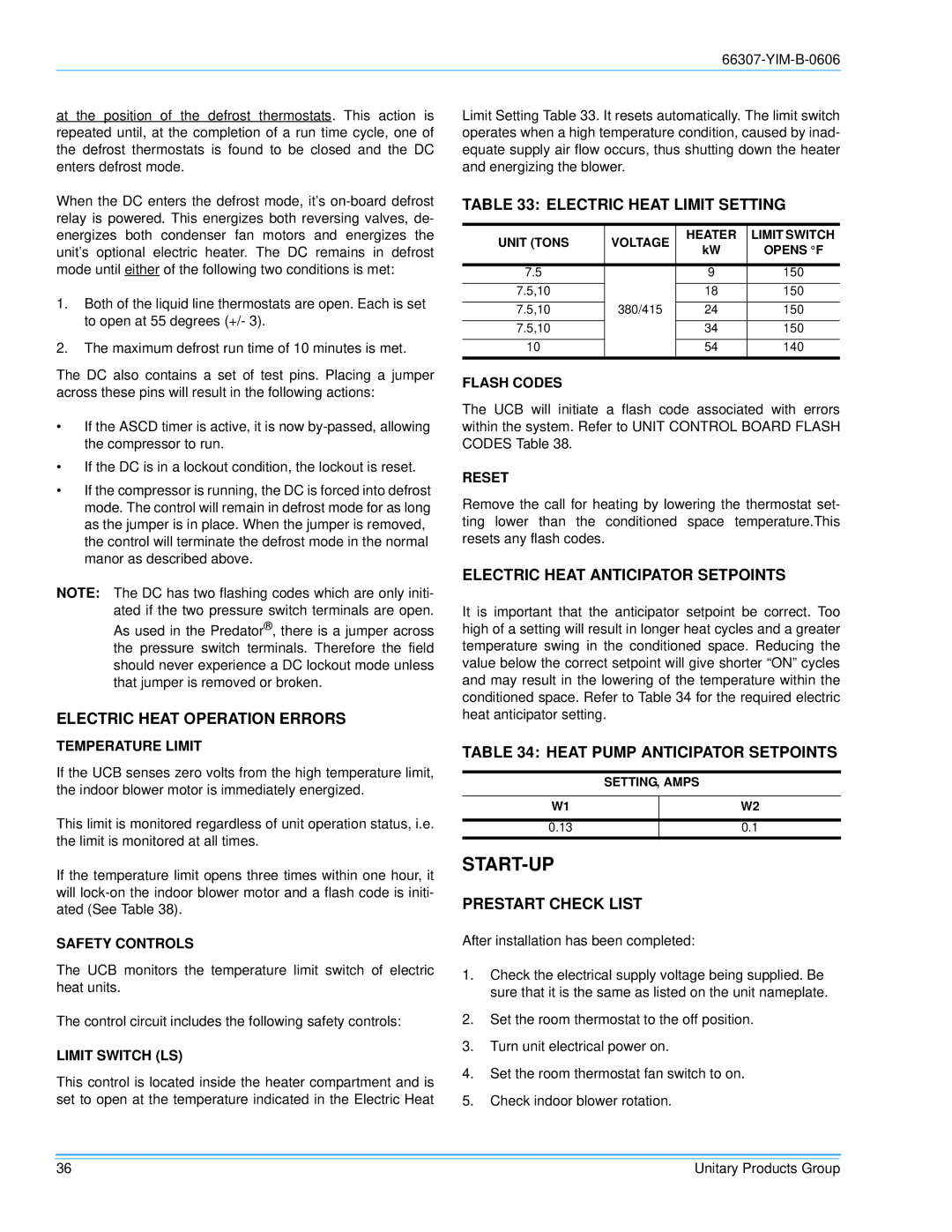
at the position of the defrost thermostats. This action is repeated until, at the completion of a run time cycle, one of the defrost thermostats is found to be closed and the DC enters defrost mode.
When the DC enters the defrost mode, it’s
1.Both of the liquid line thermostats are open. Each is set to open at 55 degrees (+/- 3).
2.The maximum defrost run time of 10 minutes is met.
The DC also contains a set of test pins. Placing a jumper across these pins will result in the following actions:
•If the ASCD timer is active, it is now
•If the DC is in a lockout condition, the lockout is reset.
•If the compressor is running, the DC is forced into defrost mode. The control will remain in defrost mode for as long as the jumper is in place. When the jumper is removed, the control will terminate the defrost mode in the normal manor as described above.
NOTE: The DC has two flashing codes which are only initi- ated if the two pressure switch terminals are open.
As used in the Predator®, there is a jumper across the pressure switch terminals. Therefore the field should never experience a DC lockout mode unless that jumper is removed or broken.
ELECTRIC HEAT OPERATION ERRORS
TEMPERATURE LIMIT
If the UCB senses zero volts from the high temperature limit, the indoor blower motor is immediately energized.
This limit is monitored regardless of unit operation status, i.e. the limit is monitored at all times.
If the temperature limit opens three times within one hour, it will
SAFETY CONTROLS
The UCB monitors the temperature limit switch of electric heat units.
The control circuit includes the following safety controls:
LIMIT SWITCH (LS)
This control is located inside the heater compartment and is set to open at the temperature indicated in the Electric Heat
Limit Setting Table 33. It resets automatically. The limit switch operates when a high temperature condition, caused by inad- equate supply air flow occurs, thus shutting down the heater and energizing the blower.
TABLE 33: ELECTRIC HEAT LIMIT SETTING
UNIT (TONS | VOLTAGE | HEATER | LIMIT SWITCH | |
kW | OPENS °F | |||
|
| |||
|
|
|
| |
7.5 |
| 9 | 150 | |
7.5,10 |
| 18 | 150 | |
| 380/415 |
|
| |
7.5,10 | 24 | 150 | ||
7.5,10 |
| 34 | 150 | |
10 |
| 54 | 140 |
FLASH CODES
The UCB will initiate a flash code associated with errors within the system. Refer to UNIT CONTROL BOARD FLASH CODES Table 38.
RESET
Remove the call for heating by lowering the thermostat set- ting lower than the conditioned space temperature.This resets any flash codes.
ELECTRIC HEAT ANTICIPATOR SETPOINTS
It is important that the anticipator setpoint be correct. Too high of a setting will result in longer heat cycles and a greater temperature swing in the conditioned space. Reducing the value below the correct setpoint will give shorter “ON” cycles and may result in the lowering of the temperature within the conditioned space. Refer to Table 34 for the required electric heat anticipator setting.
TABLE 34: HEAT PUMP ANTICIPATOR SETPOINTS
| SETTING, AMPS | |
|
|
|
W1 |
| W2 |
|
|
|
0.13 |
| 0.1 |
START-UP
PRESTART CHECK LIST
After installation has been completed:
1.Check the electrical supply voltage being supplied. Be sure that it is the same as listed on the unit nameplate.
2.Set the room thermostat to the off position.
3.Turn unit electrical power on.
4.Set the room thermostat fan switch to on.
5.Check indoor blower rotation.
36 | Unitary Products Group |
